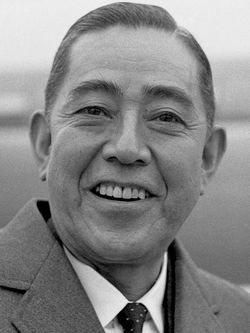
Cause of death: stroke
Eisaku Satō (佐藤 栄作, Satō Eisaku, 27 March 1901 – 3 June 1975) was a Japanese politician who served as prime minister of Japan from 1964 to 1972. He is the third longest-serving Japanese prime minister, and the second by longest uninterrupted service. Satō is best remembered for presiding over a long period of economic growth and Japan's re-emergence as a leading world power after World War II.
Born in Yamaguchi Prefecture, Satō was a member of the Satō–Kishi–Abe family and the younger brother of prime minister Nobusuke Kishi. Satō graduated from Tokyo Imperial University in 1924 and joined the Ministry of Railways. After the war, he entered the National Diet in 1949 as a member of the Liberal Party, and served in a series of cabinet positions, first as telecommunications minister from 1951 to 1952 then as construction minister from 1952 to 1953. He was chief cabinet secretary to prime minister Shigeru Yoshida from 1953 to 1954, and joined the Liberal Democratic Party. Ikeda served as finance minister in 1958–1960 under Nobusuke Kishi, and as international trade and industry minister in 1961–1962 under Hayato Ikeda.
In 1964, Satō succeeded Ikeda as LDP president and prime minister. He had the support of business and finance, and presided over a period of rapid economic growth. In foreign policy, he established relations with South Korea and maintained close relations with the United States, allowing the U.S.–Japan Security Treaty to renew in 1970 and arranging for the return of Okinawa to Japan in 1972. In 1967, Satō introduced the "Three Non-Nuclear Principles" (the non-production, non-possession, and non-introduction of nuclear weapons in Japan) and brought his country into the Nuclear Non-Proliferation Treaty, for which he received the Nobel Peace Prize as a co-recipient in 1974. Facing mounting economic problems and falling approval ratings in the early 1970s, Satō resigned in 1972 and was succeeded as prime minister by Kakuei Tanaka. Satō quickly lost his political influence within the LDP when his protégé Takeo Fukuda did not succeed him.
Source : Wikipedia